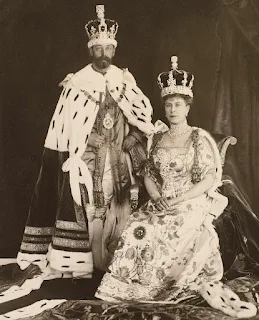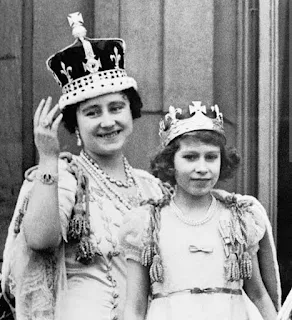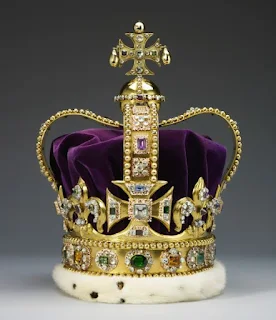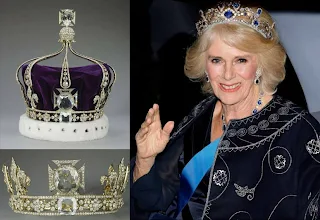It has been announced by Buckingham Palace that Camilla, the Queen Consort will be crowned with the modified version of Queen Mary's Crown on May 6, 2023, together with King Charles III.
It further says that the crown will be reset by Cullinan Diamonds, which are part of the private jewelry collection of Queen Elizabeth II, as a tribute to the late monarch.
 |
| Queen Mary's Coronation Crown with Koh-i-Noor diamond in the center with purple velvet fabric and trimmed by ermine band. Credit: Royal Collection Trust |
 |
| Queen Elizabeth II mostly used her Cullinan diamonds as brooches |
 |
| Queen Elizabeth II wore her Cullinan diamond as a brooch |
 |
| Queen Mary's Coronation Crown with Koh-i-Noor diamond without the arches and purple velvet fabric |
However, the one that attracted interest and attention to the decision is the removal of the controversial Koh-i-Noor diamond from the center cross of Queen Mary's coronation crown.
Instead, the crown will be reset with Queen Elizabeth II's Cullinan III, IV, and V diamonds as a tribute to the late beloved monarch. These diamonds were worn by the late Queen in brooches and were taken from the Cullinan diamond, discovered in South Africa.
 |
| Queen Elizabeth II's magnificent Cullinan diamonds |
The four of the crown's detachable arches will be removed also to create a different identity for Queen Camilla. Queen Mary's crown was made by Garrard's Jeweler for the 1911 Coronation of King George V. It was inspired by the coronation crown of King George V's mother, Queen Alexandra, in 1902.
The mother of Queen Elizabeth II, also named Queen Elizabeth, also commissioned a new crown during the 1937 coronation of King George VI. The crown was fitted with the Koh-i-Noor diamond in the center cross.
 |
| Queen Elizabeth's (the Queen Mother) coronation crown in 1937 with Koh-i-Noor diamond |
The controversial Koh-i-Noor Diamond
According to some political analysts, the decision to remove the Koh-i-Noor diamond from the Queen Mary's crown is to avoid a diplomatic row with India.
 |
| Coronation portrait of King George V and Queen Mary in 1911 |
Since the accession to the throne of King Charles III, there has been a lot of discussion as to what crown Camilla will wear on the Coronation day and whether she will wear the crown with Koh-i-Noor.
Koh-i-Noor, which means "Mountain of Light" in Persian, is one of the largest cut diamonds in the world and its rightful owner has been disputed. India made several claims to be the rightful owner.
 |
| Queen Elizabeth, later the Queen Mother, during King George VI's coronation in 1937, with her is Princess Elizabeth, the future Queen Elizabeth II |
A lot of theories and myths have been attached to Koh-i-Noor diamond but most historians would agree that this diamond was taken from India in 1739 by Nader Shah, an Iranian ruler, and later acquired by Ranjit Singh, ruler of the state of Punjab, a region located between Pakistan and India, but now part of northwest India.
Following the annexation of Punjab to the British empire, Koh-i-Noor diamond was handed over to the British governor-general in 1849, intended as a gift to Queen Victoria according to a popular theory.
Eventually, Prince Albert, the husband of Queen Victoria had it recut to make it shine brighter. It was set in a brooch for Queen Victoria and incorporated into the Crown Jewels.
Despite signing treaties of friendship with Ranjit Singh, after his death the British began garrisoning troops around the border.
Alone and terrified, the 10-year-old Duleep Singh was surrounded by British men and told to sign away his future. Later in life, Duleep Singh attempted to take legal action against the British over their conduct. But living in exile in England by this time, he was thwarted at every turn and eventually died a broken man.
In 2016, an Indian NGO filed a petition asking the court to direct the Indian government to bring back the diamond.
Tushar Gandhi, the great-grandson of independence leader Mahatma Gandhi, said in 2009 that it should be returned as "atonement for the colonial past".
The Narendra Modi's (the current Prime Minister of India) government said it would do everything in its power to "amicably" encourage the British royal court to give back the diamond.
It made headlines when India's Solicitor-General, Ranjit Kumar, told the Indian Supreme Court that the Koh-i-Noor diamond was forcibly taken and stolen by the British from the frightened boy king, Duleep Singh of Punjab.
Kumar's comment received mixed reactions and the Indian government was surprised with his statement. To avoid a full-scale political row, the office of the Prime Minister intervened and the culture ministry issued a clarification.
The Indian government "further reiterates its resolve to make all possible efforts to bring back the Koh-i-Noor diamond in an amicable manner", clarifying that the diamond was not "stolen nor forcibly taken away". Rather, it had been given to Britain by the successors of Maharajah Ranjit Singh "as compensation for help in the Sikh wars".
However, India is not the only country that claimed as the rightful owner of this precious diamond. Pakistan too, because Lahore, the former capital of Punjab, is geographically part of Pakistan.
 |
| King Charles III will be crowned with St. Edward Crown during the service at Westminster Abbey |
So Koh-i-Noor diamond has a chaotic backstory it is just right to exclude it at King Charles III's historic coronation this coming May.
The 74-year-old British monarch will wear the St. Edward Crown, which had been worn by his mother, Queen Elizabeth II, and his grandfather, King George VI, at their respective Coronation.







0 Comments